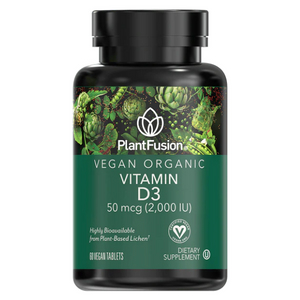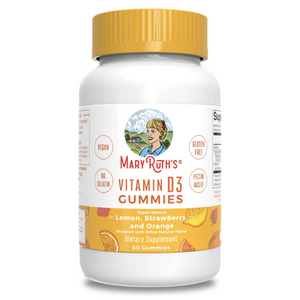Best Vegan Vitamin D Supplements 2024: 5 Brands For Vegetarians
All articles are produced independently. When you click our links for purchasing products, we earn an affiliate commission. Learn more about how we earn revenue by reading our advertise disclaimer.
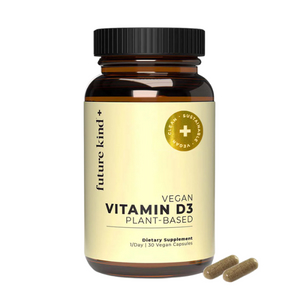
Future Kind+ Vegan Vitamin D3 Supplement
- No unnecessary excipients.
- Third-party tested.
- Eco-friendly packaging, carbon-neutral shipments.
10% Off Coupon: 10OFF
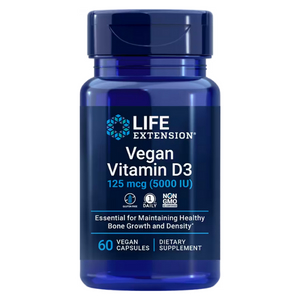
Life Extension Vegan Vitamin D3
- High dose — 5000 IU per capsule.
- Cheapest option per capsule.
- Well-known brand.
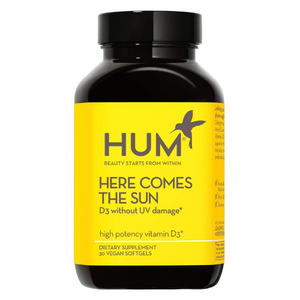
HUM Nutrition Here Comes The Sun
- Softgels rather than capsules.
- Third-party tested.
- Formulated by registered dietitians.
Vitamin D is an essential nutrient that our body makes in the skin from sunlight exposure. It’s crucial for immune function, mood regulation, bone health, and energy levels. We can also get this vitamin from some foods.
Up to 41% of adults in the United States are deficient in Vitamin D, and vegans are often lower in vitamin D compared to the general population. What’s more, vitamin D is stored in body fat, so a deficiency is common after weight loss.
However, it’s not easy to get enough vitamin D from the sun or foods alone — especially if you spend a lot of time indoors, wear sunscreen, live in a polluted area, or it’s winter.
Most of the best vegan multivitamins contain vitamin D, but sometimes it’s not at the optimal dose or in the most absorbable form. In this article, we pick our favorite best vegan vitamin D supplement, discuss why vegans should supplement, and talk about how much of this vitamin you need.
5 Best Vegan Vitamin D Supplements On The Market In (May. 2024)
- Future Kind+ Vegan Vitamin D3 Supplement – Editor’s Choice
- Life Extension Vegan Vitamin D3 – Best High-Dose Vegan Vitamin D Supplement
- HUM Nutrition Here Comes The Sun – Best Vegan Vitamin D Soft Gels
- PlantFusion Vegan Organic Vitamin D3 – Best Organic Vegan Vitamin D Supplement
- Mary Ruth’s Vegan Vitamin D3 Gummies – Best Vegan Vitamin D Supplement For Families
What Is Vitamin D?
Vitamin D — also known as calciferol — is a fat-soluble vitamin that’s stored in our fatty tissues and produced by the skin in response to sunlight. It’s also present in some animal foods, such as fatty fish and dairy products[1] as well as fortified foods. Not getting enough vitamin D can lead to rickets in children and osteoporosis in adults.[2]
There are two main forms of vitamin D: D2 and D3. Vitamin D3, or active vitamin D, is the most bioactive form in the body. Vitamin D2, or inactive vitamin D, is how we store vitamin D in the skin before it’s activated by sunlight. As a supplemental form of vitamin D, some research suggests they have a similar bioavailability in the body,[3] while others suggest vitamin D3 is better absorbed.[4]
We can’t rely on sunlight or natural food sources for all our vitamin D needs though. While some plant-based foods, such as mushrooms — contain 10 micrograms of vitamin D2[5] per 100 grams of fresh weight — the amount may decrease with storage and cooking.
However, most vitamin D3 supplements are not vegan because they are made from a fatty substance called lanolin, which comes from sheep’s wool.
Vegan vitamin D3, conversely, comes from plant lichen, a special type of algae found on mountainsides, rocks, and trees. Rather than trying to get all your vitamin D3 from sunlight, supplementing vegan vitamin D3 can prevent vitamin D deficiency without exposing yourself to harmful UV rays.
Studies show that vitamin D-deficient subjects experience a significant increase in vitamin D levels[6] after 12 weeks of supplementing with vitamin D3.
Vegan vitamin D3 benefits include:
- Promoting cognitive health.
- Boosting mood.
- Aiding calcium absorption.
- Supporting healthy bone density.
- Helping maintain a good immune response.
So, which is the best vegan vitamin D3 supplement on the market? Here are our top five best vitamin D supplements for vegans.
5 Best Vegan Vitamin D Supplements For Vegetarians In 2024
Future Kind+ Vegan Vitamin D3 Supplement
Future Kind+’s vegan vitamin D3 is a simple, excipient-free capsule shipped in eco-friendly packaging.
- No unnecessary excipients.
- Made at an FDA-regulated facility.
- Third-party tested.
- Eco-friendly packaging, carbon-neutral shipments.
- Most expensive option.
- Not delivered in an oil-based medium.
- Might be less bioavailable.
Future Kind+’s vegan vitamin D3 supplement is unusual because it’s not delivered in a fat-based medium.
Vitamin D is fat-soluble, and some research suggests that vitamin D supplements are better absorbed when combined with a source of fat.[7]
This vegan vitamin D3 supplement provides 2,500 International Units of vitamin D3 per capsule, which equates to 313% of the Daily Value for a 2000-calorie diet.
The only other ingredients are the vegetable cellulose capsule and rice flour. Future Kind+ recommends taking one capsule per day with water.
However, this is the most expensive supplement we reviewed. It costs $19.99 for a 30-day supply as a one-off purchase, which costs a whopping $0.66 per day. You can opt to subscribe, which saves you some money at $15.99 per month, working out at $0.53 per day.
Life Extension Vegan Vitamin D3
Life Extension’s vegan vitamin D3 is high-dose and cheap but contains multiple unnecessary ingredients.
- High dose — 5000 IU per capsule.
- Cheapest option per capsule.
- Not a vegan company.
- Also offers many non-vegan vitamin D3 options.
- Contains multiple unnecessary excipients.
- May cause unwanted side effects at this dosage.
Life Extension’s vegan vitamin D3 is also derived from lichen and provides 5,000 IU of vitamin D per capsule, or 625% of the Daily Value — double that of Future Kind+. It also contains medium-chain triglyceride oils, which studies suggest might increase[8] vitamin D absorption in the gut.
However, the tolerable upper intake for vitamin D,[9] which is the safe amount one can take daily and indefinitely without negative side effects, is only 4,000 IU, so at 5,000 IU, this supplement might cause adverse effects. These symptoms may include heart rhythm abnormalities, weakness, vomiting, constipation, kidney stones, and a poor appetite with weight loss.
Moreover, this supplement contains many extra ingredients, including microcrystalline cellulose, vegetable cellulose (capsule), tapioca starch, Arabic gum, vegetable stearate, silica, ascorbic acid, and tricalcium phosphate. While none of these ingredients are known to be harmful to health, some people might be put off by the extensive ingredients list.
Life Extension is cost-effective per capsule. You’ll get 60 vegan capsules, i.e., a 60-day supply, for $16.50. That’s only $0.28 per day.
If you’re not vegan, Life Extension also offers vitamin D3 in different sizes, dosages, and forms, including a 1000 IU or 7000 IU version in non-vegan soft gels or a 2000 IU version in liquid form.
HUM Nutrition Here Comes The Sun
HUM Nutrition’s HERE COMES THE SUN vegan vitamin D3 delivers plant-based vitamin D in a base of extra-virgin olive oil in a vegan soft gel capsule with no unnecessary excipients.
- Softgels rather than capsules.
- Third-party tested.
- Formulated by registered dietitians.
- Slightly more expensive than other options.
We like HUM Nutrition’s simple formulation, which you can tell has been designed by registered dietitians. Being a fat-soluble vitamin, we’re glad to see a formulation of vitamin D3 delivered in a base of oil and encased in a vegan softgel capsule.
What’s more, there are no unnecessary excipients or ingredients you won’t understand on the list. Apart from vitamin D3 from lichen, the other ingredients include extra virgin olive oil and a vegan softgel capsule (tapioca, glycerin, and water).
This supplement delivers 2000 IUs of vitamin D3 per capsule, which is more than 100% of the recommended Daily Value for vitamin D. We like that it’s not too high a dose, leaving room to consume vitamin D3 from fortified foods and multivitamins without risking reaching the tolerable upper limit, which may cause harm or the pesky side effects associated with taking more than 4,000 IU per day.
However, at $12.00 for a 30-day supply, working out at $0.40 per day, HUM Nutrition’s vegan vitamin D3 is not the cheapest option available.
PlantFusion Vegan Organic Vitamin D3
PlantFusion uses vitamin D3 made by Vitashine and all organic ingredients but includes maltodextrin, which might cause gut issues.
- Uses a well-known trademarked ingredient, Vitashine.
- Organic formula.
- Gluten-free, dairy-free, soy-free, and Kosher.
- Not certified organic.
- Contains maltodextrin.
The plant-based vitamin D3 in PlantFusion comes from a trademarked ingredient called Vitashine, which, similar to all the other vegan vitamin D3 supplements in this review, is derived from lichen. What’s different is that this ingredient is certified organic.
In fact, PlantFusion’s vegan vitamin D3 is 100% organic and formulated with all-natural ingredients, including organic agave inulin powder, organic tapioca dextrose, organic acacia gum, organic pea starch, organic coating (organic tapioca maltodextrin, organic sunflower lecithin, organic palm oil, organic guar gum), and silica.
However, maltodextrin, whether organic or not, may cause gut dysbiosis[10] and is not generally an ingredient we want in our supplements.
A 60-day supply costs $18.97, which equals $0.33 per day. You can also sign up for a subscription, costing $14.23 per 60 capsules or $0.23 per day — the cheapest subscription option available.
Mary Ruth’s Vegan Vitamin D3 Gummies
Naturally-flavored vitamin D3 gummies that are suitable for both adults and children but contain added cane sugar.
- Gummies rather than capsules.
- Lower dose to suit multiple needs.
- Suitable for children.
- Most expensive per daily dose.
- Contains added sugar.
These vitamin D3 Gummies offer 1,000 IU per gummy and come in three different flavors in one bottle: strawberry, lemon, and orange. Children aged two years old and over can take one gummy per day — or at a dose recommended by a healthcare professional.
However, these do contain added sugar as cane sugar, with each gummy providing one gram of added sugar and five calories. Just remember to practice good dental hygiene when consuming sugar-containing products.
Other ingredients include organic tapioca syrup, purified water, pectin, natural flavors, citric acid, sodium citrate, coconut oil, black carrot color, beta-carotene color, and carnauba wax.
However, they don’t come cheap. A 60-day supply costs $25.95 as a one-off purchase, costing $0.43 per gummy. If you subscribe, it’ll cost you $23.36 monthly, working out to $0.39 per gummy.
Due to the significantly lower dose compared to the other supplements we reviewed, this is quite expensive. However, if you have children, these gummies might be your best option.
Should Vegans Take a Vitamin D Supplement?
Yes, most vegans should supplement vitamin D3. A significant proportion of the U.S. population has low vitamin D levels. According to the latest EPIC-Oxford Study, those following a vegan diet are at even greater risk of insufficient vitamin D levels.
That’s because most of us don’t spend enough time outdoors, and the sunlight isn’t strong enough in winter for our skin to make vitamin D3. What’s more, the following groups tend to have lower vitamin D levels:
- Darker skinned individuals, which makes it harder to absorb sunlight.
- Athletes.[11]
- Those aged over 50 years old due to reduced skin synthesis.[12]
- Those who are overweight or obese.
In any case, relying on sun exposure for your vitamin D is not recommended — even during the summer months. You would need to spend at least 20 minutes in direct sunlight without sunscreen because sunscreen blocks the UV rays your skin needs to make vitamin D. As you’re probably aware, too much UV light increases the risk of sunburn and skin cancer, so oral vitamin D from supplements is the safest, most reliable option.
Health Benefits Of Taking Vegan Vitamin D Supplements
Bone Health And Immune Wellness
Vitamin D — alongside vitamin K and other essential minerals such as phosphate — is essential for maintaining bone mineralization[13] and healthy bone development.
Vitamin D helps the body absorb calcium and facilitates phosphate absorption — an important step in supporting bone health.[14]
Vitamin D also plays a critical role in immune system health and function. Studies show impaired vitamin D levels are associated with a poor immune response[15] and increased inflammatory reactions.
Boosts Mood, Energy, And Brain Function
Vitamin D is also important for maintaining cognitive function, especially as you age. Studies show that normal blood vitamin D levels are associated with better scores on cognitive tests.
What’s more, vitamin D levels significantly affect mood. Multiple large clinical trials show that taking vitamin D for at least eight weeks reduces depression symptoms and improves negative emotions.[16]
Supplementing vitamin D is especially beneficial if you suffer from seasonal depression. One clinical trial showed supplementation with 400–800 IUs of vitamin D3 for just five days during winter months significantly enhanced a positive mood[17] compared to a placebo.
Finally, a vitamin D deficiency might increase the risk of unexplained fatigue,[18] and supplementing vitamin D can improve energy levels.[19]
How Much Vitamin D Should Vegans Take?
Optimal blood vitamin D levels,[9] otherwise known as 25-hydroxy vitamin D, can be measured via a blood test and should be between 50–80 nanograms per milliliter year-round.
To maintain adequate levels, the Recommended Dietary Allowances for Vitamin D[9] in the United States are:
- Infants aged <12 months: 10 micrograms, or 400 IU.
- Children aged 1-18 years and adults aged 19-70 years: 15 micrograms, or 600 IU.
- Older adults aged >70 years: 20 micrograms, or 800 IU.
The tolerable upper limit for vitamin D3 supplements is set at 4,000 IU, which is the daily dose one can take indefinitely without experiencing adverse effects. However, some sources suggest that those with low serum vitamin D levels might need more than 4,000 IU daily to increase serum levels.
The upper limit for vitamin D, set by the 2011 Food and Nutrition Board, is 4,000 IU per day. This is defined as the highest level of daily consumption that causes no side effects in humans when used indefinitely without medical supervision. However, some sources suggest that those with low vitamin D levels might need more than 4,000 IU daily to increase serum levels.
The same board set the No Observed Adverse Effects Level (NOAEL) at 10,000 IU daily. The NOAEL is the dose at which there are no published studies showing any adverse effects of that dosage. In fact, the upper limit for vitamin D was calculated by dividing 10,000 IU by 2.5 to provide a conservatively safe daily dose.
How To Choose The Best Vegetarian Vitamin D Supplement
Choosing the best vegetarian or vegan-friendly vitamin D supplement depends on a few factors.
Firstly, consider the dose that you need. If you regularly consume a range of fortified foods, such as plant-based milk, you might not need as high a dose from a vegan supplement. The same goes for if you regularly take a multivitamin.
Secondly, ensure that the supplement provides vitamin D3 — not vitamin D2 — from plant-based sources, namely, lichen. If you are vegan and you’re unsure, you might want to choose vegan supplements that are certified vegan, usually by the Vegan Society, to ensure they are free from animal products.
Finally, it might be best to choose an oil-based supplement to ensure the best possible bioavailability of vitamin D3.
Frequently Asked Questions
Yes, most people following a vegan diet are recommended to take a vitamin D supplement because there are not many natural vegan food sources of vitamin D.
Guidelines recommend a minimum daily dose of 800 IUs of vitamin D3. However, if you are already deficient, you will probably need a repletion dose. Talk to your doctor or a registered dietitian about the optimum repletion dosage regime to get your vitamin D blood levels back into the normal range within a reasonable length of time.
Vegan vitamin D3 comes from lichen, which is a type of algae found growing on mountainsides, rocks, and trees.
+ 19 sources
Health Canal avoids using tertiary references. We have strict sourcing guidelines and rely on peer-reviewed studies, academic researches from medical associations and institutions. To ensure the accuracy of articles in Health Canal, you can read more about the editorial process here
- Benedik, E. (2022). Sources of vitamin D for humans. International Journal for Vitamin and Nutrition Research, [online] 92(2), pp.118–125. doi:https://doi.org/10.1024/0300-9831/a000733.
- Sizar O;Khare S;Goyal A;Givler A (2022). Vitamin D Deficiency. [online] Available at: https://pubmed.ncbi.nlm.nih.gov/30335299/
- Borel, P., Caillaud, D. and Cano, N.J. (2013). Vitamin D Bioavailability: State of the Art. Critical Reviews in Food Science and Nutrition, [online] 55(9), pp.1193–1205. doi:https://doi.org/10.1080/10408398.2012.688897.
- Wilson, L.R., Tripkovic, L., Hart, K.H. and Lanham-New, S.A. (2017). Vitamin D deficiency as a public health issue: using vitamin D2or vitamin D3in future fortification strategies. Proceedings of the Nutrition Society, [online] 76(3), pp.392–399. doi:https://doi.org/10.1017/s0029665117000349.
- Cardwell, G., Bornman, J., James, A. and Black, L. (2018). A Review of Mushrooms as a Potential Source of Dietary Vitamin D. Nutrients, [online] 10(10), p.1498. doi:https://doi.org/10.3390/nu10101498.
- Tripkovic, L., Wilson, L.R., Hart, K., Johnsen, S., de Lusignan, S., Smith, C.P., Bucca, G., Penson, S., Chope, G., Elliott, R., Hyppönen, E., Berry, J.L. and Lanham-New, S.A. (2017). Daily supplementation with 15 μg vitamin D2 compared with vitamin D3 to increase wintertime 25-hydroxyvitamin D status in healthy South Asian and white European women: a 12-wk randomized, placebo-controlled food-fortification trial. The American Journal of Clinical Nutrition, [online] 106(2), pp.481–490. doi:https://doi.org/10.3945/ajcn.116.138693.
- Silva, M.C. and Furlanetto, T.W. (2017). Intestinal absorption of vitamin D: a systematic review. Nutrition Reviews, [online] 76(1), pp.60–76. doi:https://doi.org/10.1093/nutrit/nux034.
- Guo, Y., Xu, Y., Zhang, T., Wang, Y., Liu, R., Chang, M. and Wang, X. (2022). Medium and long-chain structured triacylglycerol enhances vitamin D bioavailability in an emulsion-based delivery system: combination of in vitro and in vivo studies. Food & Function, [online] 13(4), pp.1762–1773. doi:https://doi.org/10.1039/d1fo03407c.
- Nih.gov. (2015). Office of Dietary Supplements – Vitamin D. [online] Available at: https://ods.od.nih.gov/factsheets/VitaminD-HealthProfessional/
- Arnold, A.R. and Chassaing, B. (2019). Maltodextrin, Modern Stressor of the Intestinal Environment. Cellular and Molecular Gastroenterology and Hepatology, [online] 7(2), pp.475–476. doi:https://doi.org/10.1016/j.jcmgh.2018.09.014.
- Todd, J.J., Pourshahidi, L.K., McSorley, E.M., Madigan, S.M. and Magee, P.J. (2014). Vitamin D: Recent Advances and Implications for Athletes. Sports Medicine, [online] 45(2), pp.213–229. doi:https://doi.org/10.1007/s40279-014-0266-7.
- Chalcraft, J.R., Cardinal, L.M., Wechsler, P.J., Hollis, B.W., Gerow, K.G., Alexander, B.M., Keith, J.F. and Larson-Meyer, D.E. (2020). Vitamin D Synthesis Following a Single Bout of Sun Exposure in Older and Younger Men and Women. Nutrients, [online] 12(8), p.2237. doi:https://doi.org/10.3390/nu12082237.
- Charoenngam, N., Shirvani, A. and Holick, M.F. (2019). Vitamin D for skeletal and non-skeletal health: What we should know. Journal of Clinical Orthopaedics and Trauma, [online] 10(6), pp.1082–1093. doi:https://doi.org/10.1016/j.jcot.2019.07.004.
- Veldurthy, V., Wei, R., Oz, L., Dhawan, P., Jeon, Y.H. and Christakos, S. (2016). Vitamin D, calcium homeostasis and aging. Bone Research, [online] 4(1). doi:https://doi.org/10.1038/boneres.2016.41.
- Prietl, B., Treiber, G., Pieber, T. and Amrein, K. (2013). Vitamin D and Immune Function. Nutrients, [online] 5(7), pp.2502–2521. doi:https://doi.org/10.3390/nu5072502.
- Cheng, Y., Huang, Y. and Huang, W. (2020). The effect of vitamin D supplement on negative emotions: A systematic review and meta‐analysis. Depression and Anxiety, [online] 37(6), pp.549–564. doi:https://doi.org/10.1002/da.23025.
- Lansdowne, A.T.G. and Provost, S.C. (1998). Vitamin D 3 enhances mood in healthy subjects during winter. Psychopharmacology, [online] 135(4), pp.319–323. doi:https://doi.org/10.1007/s002130050517.
- Johnson, K. and Sattari, M. (2015). Vitamin D deficiency and fatigue: an unusual presentation. SpringerPlus, [online] 4(1). doi:https://doi.org/10.1186/s40064-015-1376-x.
- Beckmann, Y., Türe, S. and Duman, S.U. (2019). Vitamin D deficiency and its association with fatigue and quality of life in multiple sclerosis patients. EPMA Journal, [online] 11(1), pp.65–72. doi:https://doi.org/10.1007/s13167-019-00191-0.

